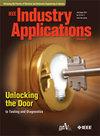Knowledge-Inspired Data-Aided Robust Power Flow in Distribution Networks With ZIP Loads and High DER Penetration
IF 4.2
2区 工程技术
Q2 ENGINEERING, ELECTRICAL & ELECTRONIC
引用次数: 0
Abstract
Characterized by increasing penetration of distributed energy resources, active distribution networks necessitate developing uncertainty-adaptive power flow (PF) algorithms to cover broad operating conditions. Despite the success of data-driven methods in improving such adaptivity, the efficacy of these methods relies heavily on large, precise, and outlier-free datasets, which limits their materialization in practical grids. To address these dual issues, this paper proposes a knowledge-inspired data-aided robust PF algorithm in unbalanced distribution systems with ZIP load models and high penetration of distributed energy resources. The proposed method first uses Taylor expansion to derive an explicitly analytical linear solution for the PF calculation. A data-driven support vector regression-based method is further proposed to mitigate the approximation loss of the linearized PF model, which might surge in widening voltage variations. Inspired by physical knowledge of distribution system operation, the proposed method can adapt to a wide range of operating conditions without retraining and thus can be applied to passive/active distribution networks. Case studies in the IEEE 13- and 123-bus unbalanced feeders illustrate that the proposed algorithm exhibits superior computation efficiency and guaranteed accuracy, under variable penetration levels and lightweight datasets.求助全文
约1分钟内获得全文
求助全文
来源期刊

IEEE Transactions on Industry Applications
工程技术-工程:电子与电气
CiteScore
9.90
自引率
9.10%
发文量
747
审稿时长
3.3 months
期刊介绍:
The scope of the IEEE Transactions on Industry Applications includes all scope items of the IEEE Industry Applications Society, that is, the advancement of the theory and practice of electrical and electronic engineering in the development, design, manufacture, and application of electrical systems, apparatus, devices, and controls to the processes and equipment of industry and commerce; the promotion of safe, reliable, and economic installations; industry leadership in energy conservation and environmental, health, and safety issues; the creation of voluntary engineering standards and recommended practices; and the professional development of its membership.
 求助内容:
求助内容: 应助结果提醒方式:
应助结果提醒方式:


